cyber security
Derechos Digitales has mapped cases involving the abusive use of cybercrime regulation to silence and criminalise women and LGBTQIA+ people around the world, and the results warn of the inherent danger of imposing international standards in this matter without building in human rights safeguards.
Given that digital technologies and the laws and norms that govern them have the potential to perpetuate and worsen pre-existing structural inequalities, APC and Derechos Digitales believe that a central element of this future convention should be the integration of a gender perspective.
In March 2021, shortly before the elections scheduled for August, then Zambian president Edgar Lungu quickly signed and enacted three internet-related laws, one of which has remained especially problematic into 2022: the Cyber Security and Cyber Crimes Act.
Since early 2021, the Kingdom of Eswatini has been gripped by waves of civil unrest, with reports of internet shutdowns implemented by the government in response to protests. It is in this climate of suspicion and unrest that cybercrime and data protection laws were gazetted in early 2022.
Fraud is now the commonest crime in the UK, and most of it is online. Cybercrime and cybersecurity have become some of the biggest problems in digital policy development, and we need to think broader and listen to victims to be able to respond to them.
A joint letter urges members of the UN Ad Hoc Committee drafting a potential Cybercrime Treaty to ensure that human rights protections are included at every step and global civil society is provided opportunities to participate in the development process.
Technology-facilitated violence must be understood in light of its impact on lives and livelihoods. Human security is at the heart of cyber security and therefore demands human-centric and rights-based approaches to establishing a peaceful ICT environment.
The APrIGF 2020 is taking place on 27-30 September. APC is actively supporting its members and networks as they engage in this space, and APC staff are part of the Multistakeholder Group (MSG), Programme Committee, Drafting Committee and Virtual Working Group.
APC joins FMA in denouncing the guilty verdict handed down in the cyber libel case against online media organisation Rappler’s CEO Maria Ressa and former reporter Reynaldo Santos, Jr. The case is widely regarded to be the ultimate test of the Philippines’ controversial cybercrime law.
Countering cybercrime is a key challenge that requires international cooperation. However, the approach taken in the draft resolution “Countering the use of information and communications technologies for criminal purposes” is fundamentally flawed and would restrict the use of the internet for human rights, and social and economic development.

Association for Progressive Communications (APC) 2022
Unless otherwise stated, content on the APC website is licensed under Creative Commons Attribution 4.0 International (CC BY 4.0)












